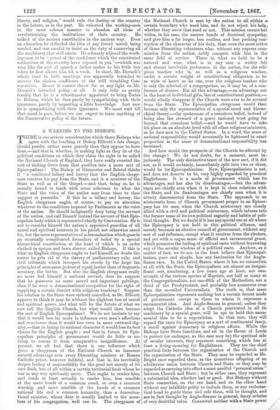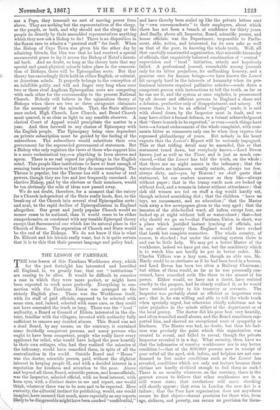A WARNING TO THE BISHOPS.
THERE is one serious consideration which those Bishops who agree with the teaching of Bishop Ellicott's late charge, should ponder rather more gravely than they appear to have done,—and that is, whether, in making light as they do of the political conditions on which they claim the right to be called the National Church of England, they have really counted the cost of sinking down from that position into a mere sect of Episcopalians ? The Bishop of Gloucester and Bristol thinks it "a continued fallacy and heresy that the English clergy- man receives his pay from the State, and is a minister of the State as well as of the Gospel,—and that, being so, he is morally bound to teach with some reference to what the State and the voice of the nation may from time to time suggest or prescribe." If this be a fallacy and heresy, the English clergyman ought, of course, to pay no attention whatever to the conditions imposed by Parliament as the voice of the nation. He should indignantly deny being the servant of the nation, and call himself instead the servant of that Epis- copalian body which is represented chiefly by Convocation. He is not to consider himself the nation's appointed guardian of all moral and spiritual interests in his parish not otherwise cared for, but the mere representative of a denomination which guards an unusually complicated formulary of belief by a special hierarchical constitution, at the head of which is an order clothed in aprons and lawn sleeves, called Bishops. If this is what an English clergyman ought to feel himself, no doubt the sooner he gets rid of the slavery of parliamentary rule, and civil tribunals which interpret his creeds by the large lax principles of men more jealous of equal justice than of dogmatic accuracy, the better. But does the English clergyman really no more feel himself a national servant, does he suppose that he possesses no more sacred and important privilege, than if he were a denominational competitor for the right of supplying a certain district with religious teaching ? Suppose his relation to the State were entirely cancelled, as Dr. Ellicott appears to think it may be without the slightest loss of moral and spiritual power, and what will be the future of what we now call the English Church, but what would then become the sect of English Episcopalians ? We do not hesitate to say that it would lose far more in influence over men's affections and consciences than it would lose even in mere outward dig- nity,—that in losing its national character it would lose its best charm for the English people ; and that in future its Epis- copalian principles of government would do little or no- thing to rescue it from comparative insignificance. At present, we all feel that there is one influence which gives a clergyman of the National Church an immense natural advantage over every Dissenting minister or Roman Catholic priest, however faithful, and that is, his inevitably deeper feeling of responsibility for the good not merely of his own flock, but of all within a certain territorial limit whom he can in any way spiritually serve. This ought to render him, and tends at least actually to render him, less sensible of the mere bonds of a common creed, or even a common worship, and more sensible of the bonds of a common national life and a common humanity, than a denomina- tional minister, whose duty is usually limited to the mem- bers of his congregation, well can be. The clergyman of
the National Church is sent by the nation to all within a- certain boundary who need him, and do not reject his help, whether they avow that need or not. This mission cannot but widen, in his case, the narrow bonds of doctrinal sympathy, and give him a far larger, less restless, and less pushing con- ception of the character of his duty, than even the most active of those Dissenting volunteers who, without any express com- mission from the nation, nobly compete with him in the same field of service. There is, what we hold to be a natural and wise, what is in any case a widely felt and almost inevitable preference, in the nation, for the reli- gious teacher who is, as well as a religious teacher, under a certain weight of constitutional obligation to be as wide of heart as he can, over the religious teacher who is only the selected of a congregation, or, it may be, of a con- ference of divines. But all this advantage,—an advantage not in the least of individual gifts, but of constitutional posit-ion,-- would wholly disappear if the Church were ever to be severed from the State. The Episcopalian clergyman would then become only the representative of a special creed and hierar- chical theory,—the spokesman of a conscious belief, instead of being also the steward of a grave national trust going far beyond that conscious belief,---and he would have to take his place on an absolute level with all other religious ministers, as he does now in the United States. In a word, the sense of national responsibility would necessarily be lightened in exact proportion as the sense of denominational responsibility was increased.
And how would the prospects of the Church be affected by the change ? We do not doubt, for a moment, most in- juriously. The only distinctive tenet of the new sect, if it did not, as it would certainly, immediately split into two or three, would be its Episcopalianism. Now, Episcopalianism is not,. and does not deserve to be, very highly regarded by practical Englishmen. It is a mode of government which has its advantages, and has also its disadvantages,—but the advan- tages are chiefly seen when it is kept in close relations with the State, and its disadvantages are chiefly seen when it is utterly disconnected from the State. The approach to an aristocratic form of Church government proper to an Episco- pacy has its uses, when the Church aristocracy are closely allied with a civil and political aristocracy, which infuses into the former some of its own political sagacity and habits of poli- tical thought. But we doubt if it has any special use at all where the Episcopacy is not held in this political alliance, and merely becomes an elective council of government, without any sort of real influence, except what it receives from the electors, and yet with a vague sense of official and sacramental grace, which promotes the feeling of spiritual caste without borrowing any of the secular wisdom of a political caste. Anyhow, as a matter of fact, we do not in the least believe that Episcopal- ianism, pure and simple, has any fascination for the Anglo- Saxon race. In the United States, where it has no connection at all with the State, the Episcopalians are almost an insigni- ficant sect, numbering, a few years ago at least, not one- seventh of the various species of Baptists, not half as many as the Congregationalists, not one-fifth of the Methodists, not a third of the Presbyterians, and probably less numerous even than the so-called Universalists. The truth is, that mere Episcopalianism represents nothing but a certain decent mode of government except to those to whom it expresses a sacramental idea. And Anglo-Saxons in general, unless they adopt the Catholic idea of a Church penetrated in all its machinery by a special grace, will be apt to hold this sacra- mental idea to be a superstition. In that case, they will regard the taste for Episcopacy as a sort of sentimental fancy, a recoil against democracy in religious affairs. While the Bishops have State functions, and sit in the House of Lords to protect (or endanger, as the case may be) the spiritual side of secular interests, they represent something which has at least a living meaning for Englishmen. They are the chief practical links between the organization of the Church and the organization of the State. They may be regarded as Mr. Bright once regarded them, as the monstrous offspring of an adulterous union between Church and State, or they may be regarded as carrying into effect a most needful "personal union" between Church and State ; but in either case, they represent a substantial idea, whether bad or good. But Bishops without State connection, on the one hand, and on the other hand. without any infallible polity to include them, or any ecclesias- tical head to guide them and rule them, will be thought, and are in fact thought by Anglo-Saxons in general, fancy articles of very doubtful value. Connected neither with a State power
nor a Pope, they transmit no sort of moving power from above. They are nothing but the representatives of the clergy, or the people, or both, and why should not the clergy or the people do directly by their assembled representatives anything which they now ash a Bishop to do There is no disposition in the Saxon race to admire a "pastoral staff" for itself. When the Bishop of Cape Town was given his the other day by admiring friends, the idea was that he had received a special sacramental grace to lay it across the Bishop of Natal's hereti- cal back. And no doubt, so long as the theory lasts that any special and quasi-physical miracle takes place in the consecra- tion of Bishops, there will be Episcopalian sects. But that theory has exceedingly little hold on either English, or colonial, or American minds. It properly belongs to the conception of an infallible polity, and will not linger very long when once two or three rival Anglican Episcopalian sects are competing with each other for the successorship to the present National Church. Nobody will believe in the miraculous theory of Bishops when there are two or three antagonist claimants for the monopoly of the miracle. That, the State alliance once ended, High Church, Low Church, and Broad Church must quarrel, is as clear as light to any sensible observer. A clerical Court of Appeal would precipitate the matter in a year. And then farewell to any chance of Episcopacy with the English people. The Episcopacy being once dependent on private subscription must be guided by the feeling of the subscribers. The subscribers would substitute their own government for the superseded government of statesmen. But a Bishop who only registers the views of those who support him is a mere ecclesiastical toy,—a plaything in lawn sleeves and apron. There is no real regard for playthings in the English mind. This people likes institutions to have at least enough of seeming basis to persuade us that they do mean something. The Throne is popular, but the Throne has still a number of real powers, though they are less and less frequently exercised. An elective Bishop, paid by the electors or their nominees, would be too obviously the relic of ideas now passed away.
We do not doubt, therefore, for a moment that the outcry for a Church independent of the State really leads, first, to the break-up of the Church into several rival Episcopalian sects ; and next, to the rapid decline of Episcopalianism in England altogether. Our great and justly popular Church would no sooner cease to be national, than it would cease to be either comprehensive, or consistent with any tenable Episcopal theory except that Sacramental one which has its natural place in the Church of Rome. The separation of Church and State would be the end of the Bishops. We do not know if this is what Dr. Ellicott and his friends really want, but it is quite certain that it is to this that their present language and policy lead.































 Previous page
Previous page